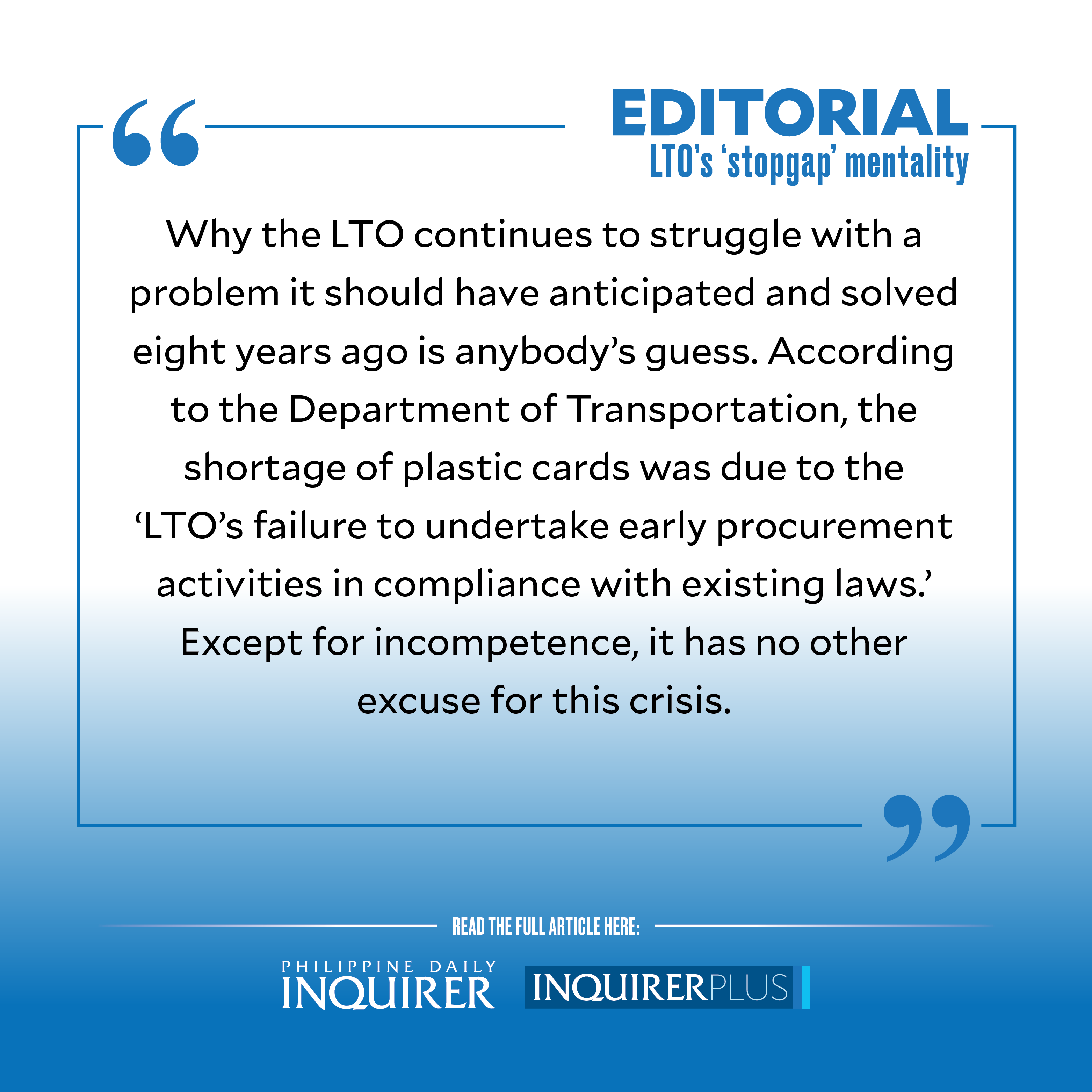LTO’s ‘stopgap’ mentality
First, the national identification card, which was finally issued after much delay, came with erroneous entries and had to be printed out on paper. Now comes the news that the driver’s license would be printed on paper as well. Can we then expect license plates to be printed on paper next? Incensed netizens have asked on social media. What a way to treat government-issued identification cards in this ID-crazed nation!
The situation would be laughable if it weren’t fraught with risks that the concerned government agencies didn’t foresee, or chose to ignore. Being flimsy, how can paper IDs and licenses withstand the expected wear and tear that come with their repeated use, especially since every official transaction in this nation demands two government-issued IDs? Not to mention the fact that being printed on paper, the information can easily be altered or faked, which puts the integrity of the driver’s license and the national ID in question.
Article continues after this advertisementHow ironic indeed that to get a government-issued ID, one needs to present other government-issued documents. For instance, to get a driver’s license, one must present, aside from a birth certificate, other acceptable IDs such as one’s passport, Social Security System card, Unified Multipurpose ID card, PhilHealth ID, TIN card, postal ID, voter’s ID, barangay ID, a Government Service Insurance System card, among others.
Noting the ridiculous and impractical number of IDs that one must carry around to transact business with both public and private agencies, the government finally found the will to issue a single national ID. Thus in 2018, Republic Act No. 11055, or the Philippine Identification System Act, was signed into law “to establish a single national identification system for all citizens and resident aliens” of the Philippines. The PhilID, dubbed as the foundational digital ID system, is intended to simplify public and private transactions by being the ultimate valid proof of one’s identity.
Well and good. Except that the good intention was ruined by the lackluster implementation of the law, which saw applicants waiting for a year or two to get their printed ID—only to be informed that they’d have to download and print it themselves. The promised personal delivery to one’s preferred address has been so rarely fulfilled that they’re celebrated with much aplomb on social media by the lucky few.
Article continues after this advertisementBy the time President Marcos took office in 2022, the Philippine Statistics Authority (PSA) found itself with a backlog of millions, prompting him to call on the agency to expedite the delivery of the PhilIDs, which could have been used for the distribution of the government’s pandemic aid to the poor and the SIM registration of mobile phone users. In October last year, the PSA decided to temporarily print the PhilIDs on paper as it struggled to cope with the printing and delivery of the cards to some 73 million applicants.
As if that were not enough inconvenience to the public, the LTO last week announced its plastic card shortage, adding that the problem first cropped up in 2015 and that it has a backlog of 5.2 million driver’s licenses, on top of millions of new applicants. Its “stopgap solution,” the LTO said, was to issue temporary licenses printed on paper and extend the validity of expiring driver’s licenses to October.
This was simply unacceptable to motorists who had applied and paid for their licenses, Sen. Grace Poe said. “We should give them the right and respectable license, not a mere piece of paper,” she said, adding that the LTO’s solution defeats the purpose of RA 10930, which extended the validity of driver’s licenses up to 10 years. Poe, who sponsored the bill’s approval in the Senate, noted that the law enacted in 2017 was meant to widen the period between renewals. This should have lessened the volume of driver’s licenses that needed to be issued each year.
Why the LTO continues to struggle with a problem it should have anticipated and solved eight years ago is anybody’s guess. According to the Department of Transportation (DOTr), the shortage of plastic cards was due to the “LTO’s failure to undertake early procurement activities in compliance with existing laws.” Except for incompetence, it has no other excuse for this crisis. Recall that the same agency has, until now, failed to deliver millions of license plates for vehicles, a problem that dates back to 2014. Sen. JV Ejercito cited a backlog of 14 million license plates as of February. How can the LTO then describe itself as the “frontline government agency showcasing fast and efficient public service for a progressive land transportation sector”?
Time for DOTr Secretary Jaime Bautista, whose department oversees the agency, to crack the whip on nonperforming LTO officials, get to the bottom of its longstanding problems, and get it back on track to fulfill its basic functions instead of it resorting to stopgap and band-aid solutions.

















